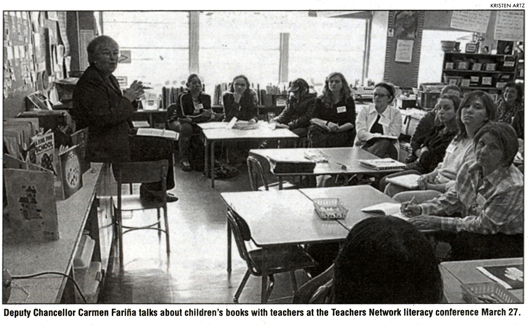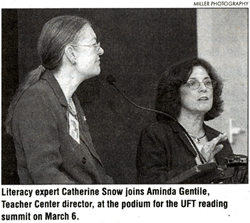Article courtesy
of New York Teacher

Reality Check
Standing
on a rock or a balance beam?
Looking
at the foundations of literacy
by
MAISIE McADOO
Let's
just admit this: Despite a year long Department
of Education promotional campaign, few people really
understand "balanced literacy."

The
DOE's mandated reading program has been described
variously as an "approach" and a"'curriculuin"' "prescriptive" and "open," "phonics-based" and "literature-based." Its
chief architect and booster, ex Deputy Chancellor
Diana Lam, was dismissed in March. By April, when
3rd graders took the high stakes citywide reading
tests, there was still widespread confusion over
the DOE's centerpiece curriculum.
Balanced
literacy was an effort to "balance" the
two factions of the reading wars phonics based
vs. whole-language instruction.
Lam's
version of balanced literacy borrowed a little
from this, a little from that, provided excruciating
detail on rugs and rocking chairs, but much looser
instruction on literacy skills like letter sounds.
Month by Month Phonics, Lam's supplementary phonics
program, was criticized as inadequate by national
reading experts.
Do
researchers disagree about how to teach reading?
Not
at all. In fact, there is quite a strong consensus
on reading instruction for young children. Studies
have repeatedly demonstrated the importance of
direct instruction in phonics, especially for beginning
readers, while incorporating rich, literature based
study into lesson&. Both elements must be there,
and the balance of the two shifts as children progress.
Learning
to read
 For
most beginning readers, skills instruction needs
to be explicit, systematic and sequenced. "Oral
language comes about in a very natural way ...
but reading is a skill. It's like piano playing
or gymnastics or tennis: it requires the inculcation
of a very wide range of complex things," according
to Reid Lyon, one of five featured speakers at
a Reading Summit sponsored by the UFT and the Teacher
Center March 6. For
most beginning readers, skills instruction needs
to be explicit, systematic and sequenced. "Oral
language comes about in a very natural way ...
but reading is a skill. It's like piano playing
or gymnastics or tennis: it requires the inculcation
of a very wide range of complex things," according
to Reid Lyon, one of five featured speakers at
a Reading Summit sponsored by the UFT and the Teacher
Center March 6.
Lyon,
chief of the Child Development Branch of the National
Institute of Child Health and Human Development
in Washington, D.C., would put himself much closer
to the phonics end of the phonics whole language
spectrum, but he speaks for most literacy researchers
in naming the essential elements of early reading.
Citing
the conclusions of the National Reading Panel,
Lyon said young readers must master five skills:
-
They
must be able to connect the squiggles on a page
with sound and meaning (phonemic awareness).
-
They
must learn the basic building blocks of words
and the tactics they can use to "decode'
them (phonics).
-
They
must systematically build vocabulary.
-
They
must practice reading fluently.
-
Their
teachers must directly instruct them on comprehension
skills.
"Comprehension
does not take care of itself," added Catherine
Snow, a second panelist at the conference. Snow
chaired the committee that prepared the report
on which the National Reading Panel based its findings.
When
older students struggle with reading, Snow said,
the problem can usually be traced back to a basic
ignorance of phonics, and to not having been directly
taught such comprehension skills as predicting
and asking questions.
Research
shows a powerful correlation between kindergarten
word-recognition skills and later comprehension
ability, "and it gets even stronger over time," she
said. By 4th grade, "the rules change on kids.
There are new learning demands, the vocabulary
load increases," while the speed, vocabulary
and comprehension skills needed to pass standardized
8th grade tests are really "huge." Children
without the necessary foundation skills tend to
lose it at these junctures.
Reading
to learn
Of
course, phonemic awareness and vocabulary building
are not the ultimate goals of reading instruction.
Literacy researchers did not set out to build a
nation of decoders. Educators want children to
go on to read for pleasure, information and enrichment.
In other words, they hope to help them make the
transition from learning to read to reading to
learn.
And
here is where the confusion around balanced literacy
may lie.
The
idea behind balanced literacy is to create a literacy-rich
environment that encourages children to read throughout
their lifetimes. It would be hard to argue with
this aim. But balanced literacy's advocates, by
not emphasizing phonics skills, have been identified
with the discredited whole-language approach.
The
solution may be a matter of emphasis and timing.
"Balanced
literacy should always be there, but it is the
major approach once children learn to read and
are engaged in reading to learn,” said Roni
Messer, coordinator of literacy professional development
at the UFT Teacher Center. “A balanced literacy
approach, along with research based early literacy
acquisition instruction, is most effective. It
is the balance that will produce proficient readers."
Are
they two different things? Not really, said Messer.
"Research
shows that emergent readers require systematic
and explicit instruction, embedded in a balanced
literacy approach."
Balanced
literacy revisited
Balanced
literacy is getting a fresh boost with the arrival
of Carmen Farina, who replaced Lam as deputy chancellor
for teaching and learning. At a recent conference
in Brooklyn, sponsored by the national organization
Teachers Network, Farina, told teachers she is
absolutely committed to balanced literacy, but
plans to clarify it. It definitely includes phonics
instruction, she said. "At no point did I
give up on basic skills." But she also encourages
a literature-based approach.
For
a workshop on literacy that she led at the Teachers
Network conference, Farina, a former teacher, principal
and superintendent, brought from home a tall stack
of colorful children's books. One by one she showed
them to the group, telling them when she had used
each book and why. "Testing Miss Malarkey" she
used to address the stress of testing; "When
Sophie Gets Angry" she used to work on classroom
management; "The Quiltmakers Gift" she
saw as a book about expertise and gave it to her
region’s math and reading coaches.
"A
Fine Fine School” is a story that speaks
to the excesses of school reform, and Farina made
it required reading for all her superintendents
when she was in charge of Region 8. She even read
one book aloud to the teachers in the workshop.
She chose "The Three Questions," a story
about finding the right answers inside yourself,
instead of relying on experts.
Teachers can assume that her message is quite direct.
They,
too, not just their supervisors, must develop reading
instruction that is both effective and deeply satisfying
to children. As UFT President Randi Weingarten
said in her closing remarks to the UFT summit,
the teacher's voice has been missing in the balanced
literacy brouhaha this year.
"We
don't expect teachers to single-handedly design
curriculum," she said, but neither should
curriculums be "teacher proof." Armed
with knowledge, teachers can make decisions in
their classrooms about reading instruction that
works best for their students.
|